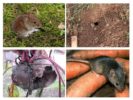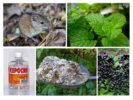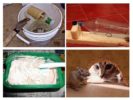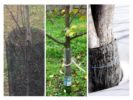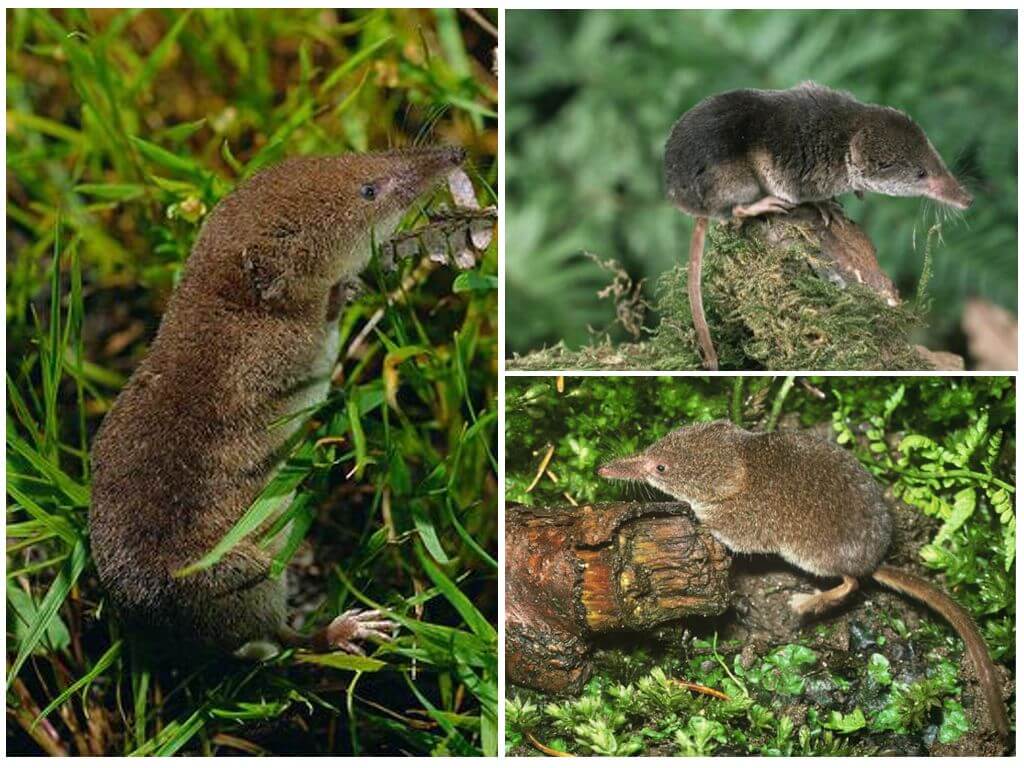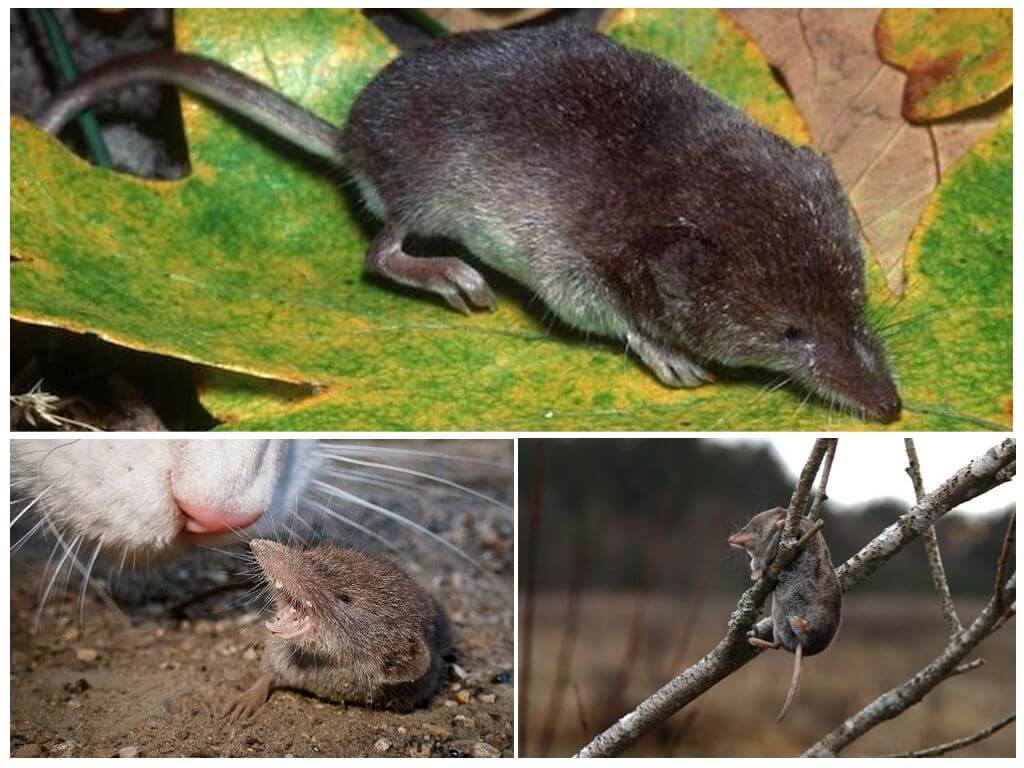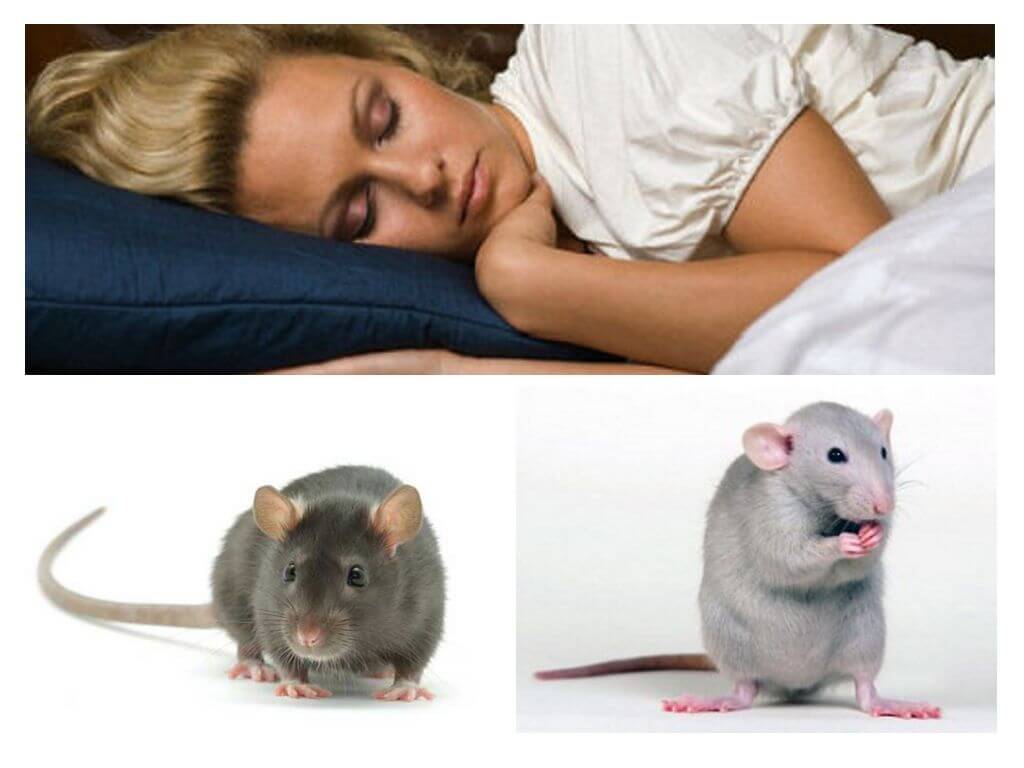- Mice in the garden
- Folk remedies for mice
- Rodent control
- Protecting trees from mice
Rodents in the garden, in the garden - a common occurrence for people involved in the cultivation of garden crops. In wild nature mice live in the fields, meadows, in the forest. To human housing are selected closer to the fall or with a significant increase in the population of mice in the natural environment. The animals are attracted by loose earth in the gardens, an abundance of food supplies, secluded places for wintering.
Methods of struggle
Small animals cause significant damage to garden crops. They leave behind pitted lawns, damaged tree trunks, dried seedlings, spoiled bulbs of plants, bitten fruits, a holey film of greenhouses, greenhouses. Each gardener, gardener tries to find an effective method of struggle to protect the site from unwanted guests.
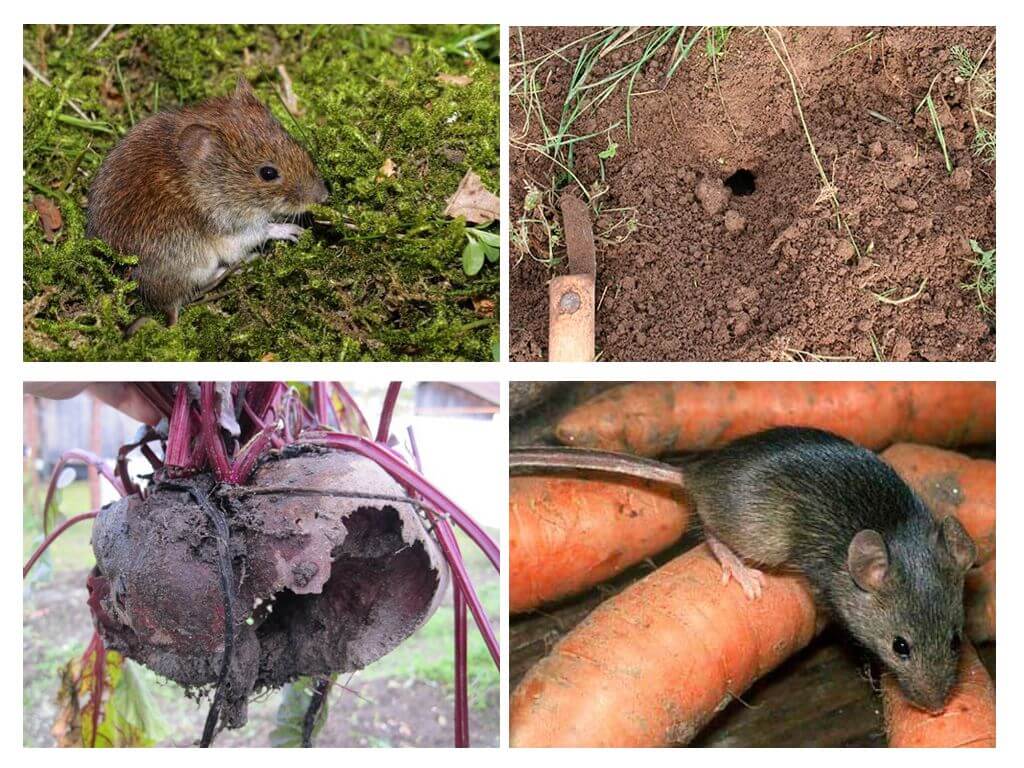
Methods of killing mice in open areas are somewhat different from the control of rodents indoors.
- Adhesive substances in the garden turn out to be completely ineffective, since they quickly become clogged and lose their properties. Glue from mice dries under the rays of the scorching sun or dissolves in the pouring rain. It is difficult to track the mouse trajectory for the effective location of the sticky drug.
- Purchased mousetraps do not give the desired result for several reasons. The territory of the garden, the garden is too large. It is necessary to use from 5 and more devices. The bait does not have such a seductive effect. There are many edible products for mice around. There is no need to get into the trap for a piece of meat or something else.
- Traps must be placed in places where mice often run. Track the path on the grass, among the greenery in the garden is impossible. Caught in a trap, one rodent makes piercing sounds, scares the rest. Mice pull out new passages, construct exits in the direction opposite to the trap, bypass the trap. Instead of pests, rodents' natural enemies — cats, foxes, dogs — can become a terrible fixture, which is undesirable.
- Poison for mice use inhumane. Since wild, native birds, animals can suffer. The cat receives a lethal dose by eating a mouse that has died from a toxic substance.
- The action of the electric repeller is limited to 3-5 meters. For this reason, several devices should be used over a large area. Powerful rodent electric repellers working on AC or batteries, you must provide access to the mains or buy batteries. The use of devices with carriers, extension cords, wires in an open area is an unsafe activity.
Fighting rodents in the garden, in the gardens is conducted by folk methods. They show high efficiency, are safe for the environment, do not require serious material costs, do not harm the tree. For the construction of an effective do-it-yourself mouse traps you need to show a little ingenuity and imagination.
Effective tools for fighting in the garden
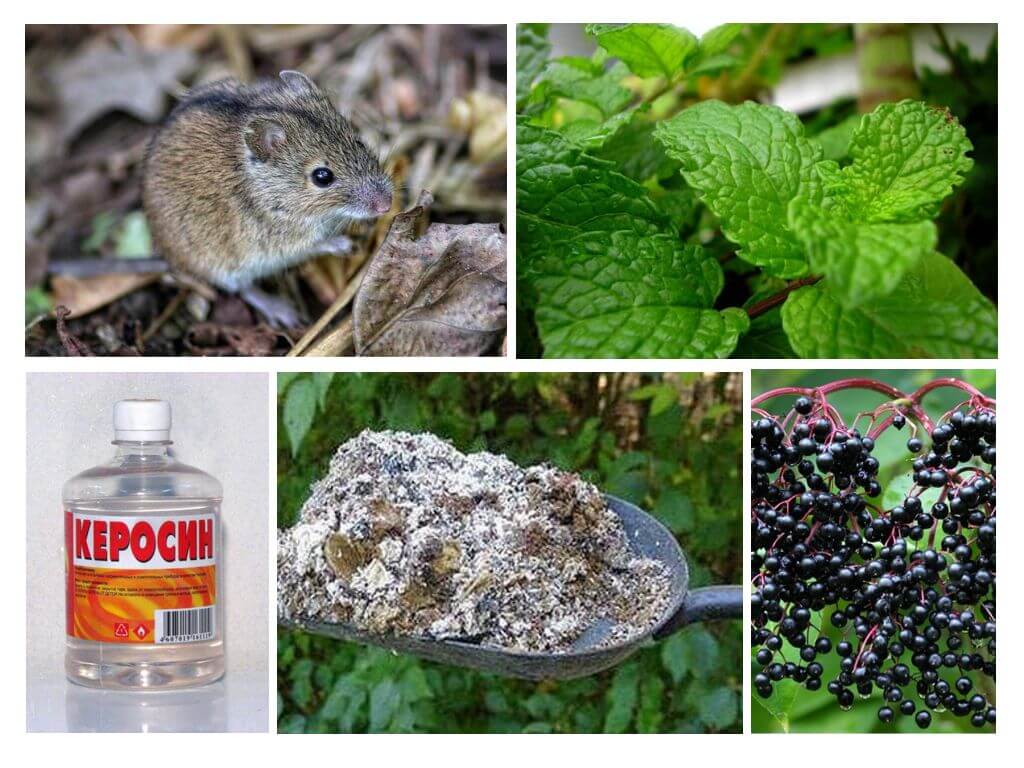
To get rid of rodents on their territory, you can scare them away or destroy them. The first method in an open area is more effective.Since the place of the destroyed mice can easily take new rodents. Events will have to be renewed with renewed vigor. You can’t do without destruction if a large number of pests are operating in the garden. The most effective option is a combination of two methods.
Rodent repellent
Animals in their activities are guided by the sense of smell. The feeling is so well developed that pungent odors bring the rodent off balance, irritate, and prevent you from orienting yourself. Can use folk remedies for miceto quickly get rid of the large army of rodents in the garden:
- The entire perimeter of the site is laid out grass from mice with an unusual sharp aroma - elderberry, tansy, black root medicinalwormwood. For prevention purposes, coriander and peppermint are grown on the garden plot. The plant repels not only mice, but also harmful insects.
- If the location of the hole is known, you can use strong-smelling chemicals. They moisten a cotton swab, tampon, piece of cloth in ammonia, kerosene, gasoline, solvent, and another strongly smelling substance. To prevent the aroma from evaporating too quickly, place the moistened object in a plastic bag, make a small hole. The prepared deterrent is placed in the hole at the entrance.
- Wood ash is scattered around the garden. It sticks to the legs, stomach of rodents, causes burning sensation. When you try to lick the stained parts of the body, the ash enters the stomach. Causes digestive irritation. The rodent does not die, but after a while begins to look for another habitat.
Interesting!
Rodents are found on all beds, except for garlic, onions. This interesting fact about mice can be put into practice - planting greens as a deterrent. Or plant vegetables in small beds in different parts of the garden.
Destructive methods
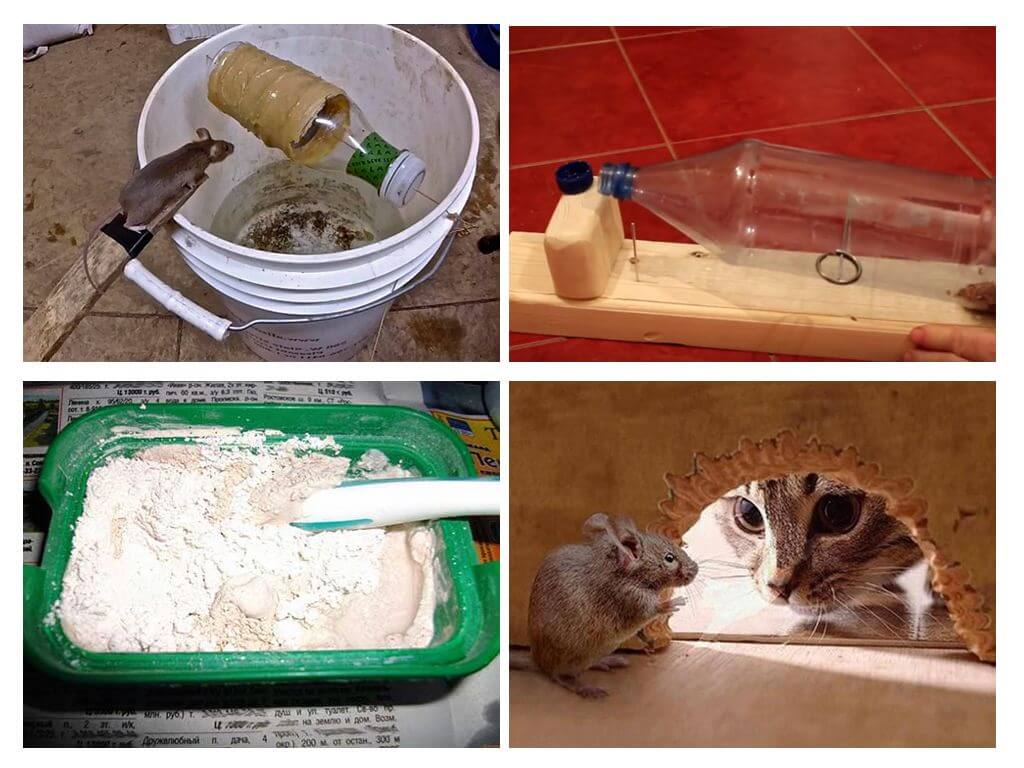
Homemade traps from improvised tools outperform purchased appliances. They build up quickly, do not threaten the safety of other animals.
- Pour water into a deep container, not reaching the edge by 3-4 cm. Add a few tablespoons of vegetable oil. Straw covered with straw. Grains of wheat, corn, and cereals are placed in the center. Build a ladder from a wooden twig, sticks, planks. The trap is simple. The rodent rises up the ladder, sees food, jumps on straw, falls into the water. You can catch a dozen pests in this way.
- A few bottles of vegetable oil are poured into a plastic bottle. Shake well for even distribution over the entire surface. Inside are placed a few grains of wheat, another bait. Bottles are laid out over the entire land plot, raising the bottom to the top. You can put a breast of earth or a pebble.
If rain is not foreseen in the near future, you can treat the mice with bait from flour and gypsum. They are mixed in equal proportions, poured into a shallow container, placed in the garden, water is placed nearby. Rodents willingly eat flour, gypsum inside hardens under the influence of moisture. Together with it all the internal organs. To accelerate the effect, a container of water is placed near the bait with gypsum.
Fatal danger to mice are weeds. It is necessary to collect a lump of prickly burdock. Position the bait inside, scatter over the land. The mouse penetrates inside, thorns cling to the wool, it finds itself in a trap, dies of hunger and exhaustion.
On a note!
The main enemy of small rodents is a cat. You can get a hunter, run on the land. She will be full, and the owner is satisfied. When choosing, you need to give preference not to beauty, but to practicality. Not everyone cats can catch mice. Little feline representatives can't handle rats.
The fight against garden rodents is carried out by similar methods, but has its own characteristics.In gardening, it is important to protect fruit trees. Most often mice eat the bark of apple trees. To protect the garden, simply placing traps for mice is not enough.
Effective Gardening Techniques
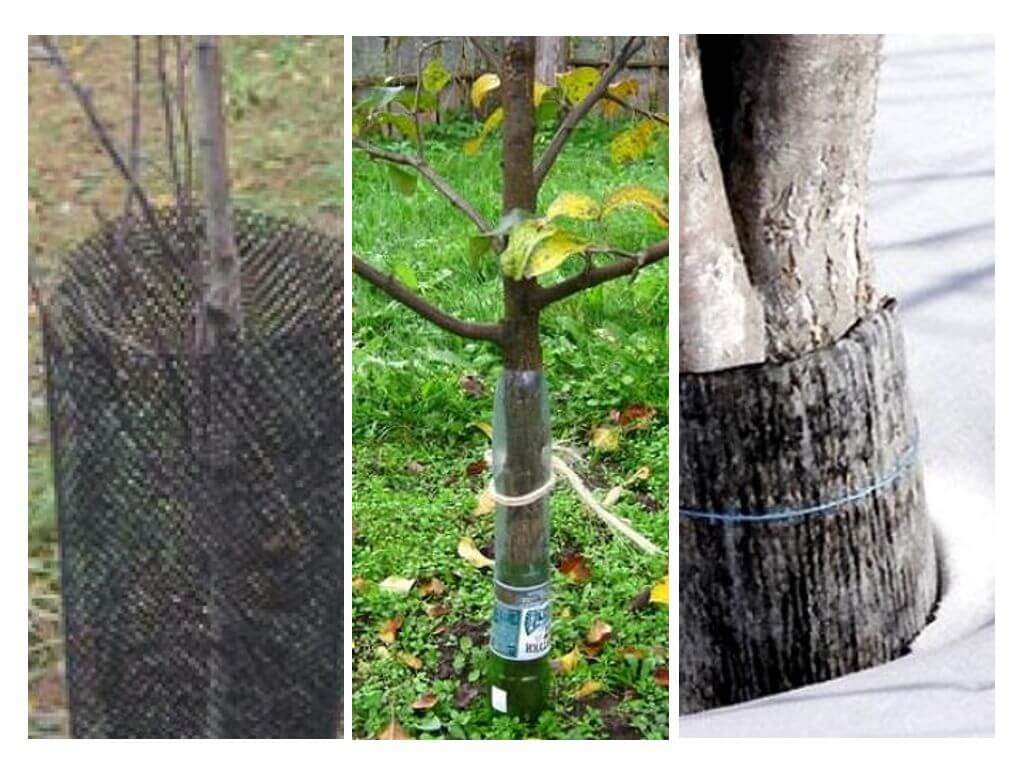
The most valuable in the garden areas are fruit trees. Garden rodents eagerly eat young shoots, gnaw on bark, feast on apples. The danger of damage to trees, fruits arises in spring, autumn.
Moscow experts note the greater effectiveness of using mechanical protection. Gardeners protect the apple tree from rodents and other fruit trees by wrapping the trunks with various materials. Use kapron, coniferous branches, roofing felt, plastic bottles without a bottom. Around the shtambov, a fine mesh, flexible plastic, and tin plates are additionally dug.
On a note!
Protective structures on tree trunks do not save in severe snowy winters. Snowdrifts rise high, rodents freely get to unprotected parts of a tree.
It is necessary to protect apple trees from rodents in advance. Preventive control methods give an excellent result.
There are several options:
- To fight mice on the plot, you need to protect it with solid iron, tin sheets, so that the animals do not have the opportunity to penetrate through the cracks. The voles will not dig up the ground, they will look for a more suitable place. Fighting rodents in the garden with this method will help to avoid trouble, if not forever, then for a long time.
- The garden should be well cleaned. Burn leaves, do not leave deposits of dry grass, mulch, tree branches. Coat the tree with a solution of lime in combination with copper sulfate. Other experts propose to build on the site a kind of dining room for rodents away from trees. In the small hole to throw out the remains of food, pour out the slops. Free access to food will divert attention from garden trees, healthy crops.
On a note!
In sunny, non-hot weather, you can use universal glue from rodents, which is intended for the construction of sticky traps. Tree trunks are smeared 50 cm high from the ground. Adhesive belt will protect not only from rodents, but also from harmful insects.
Experts have noticed that the number of mice in nature increases significantly once every 8 years. Expanding the habitat, animals approach human lands. Unfavorable factors contribute to the "relocation" of rodents - fire in the forest, in the fields, floods, lack of snow. Protect the land, fruit trees will help preventive measures, folk methods.
